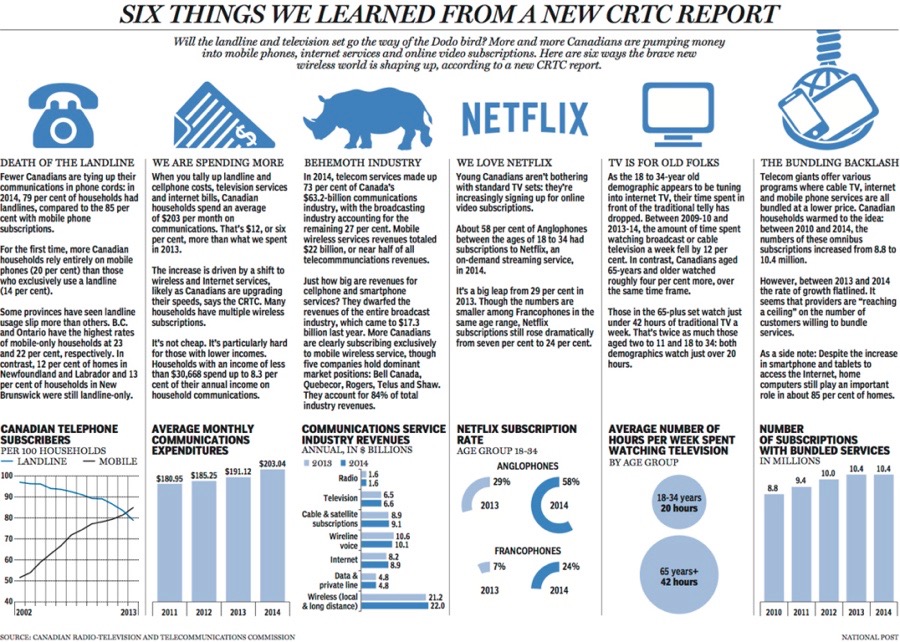Collected Data
Watch: "Unsound Preview"
The internet has transformed the world, but there are unintended consequences. Now that people expect everything on the internet to be free, what are the consequences? As the music industry collapses from the consequences of FREE, so too has journalism. What are the impacts on society when all culture becomes free? Find out who really is benefitting from the so-called free internet.
"Canadians are moving toward mobile technology."
"the current model, contemptuous of the reader and disrespecting of the art will not long last."
"If you believe that you’re somehow morally entitled to an ever-increasing industry pie, reality is going to be a merciless teacher."
"Everyone is getting paid except the people whose work moves product. It just feels wrong."
This sort of marketing just feels gross to me. I understand that people love brands and love sharing photos to show off their latest looks. Where it starts to feel weird is when companies capitalize on that without compensating the people who are helping sell their wares.
Family Photos Brought to You By These Sponsors
"All of that tracking and data collection is done without your knowledge, and — critically — without your consent."
"The vast majority of web advertising may never actually be seen by end users"
From an end user perspective, moving from a free service to a paid one would actually be a good thing because it would make the relationship between the user and companies like Google more explicit. It is hard to argue that it is acceptable to secretly track users and capture their personal details when the user is paying for a service. Whether this model is going to be as financially lucrative for Google as selling ads is yet to be seen.
Will ad blocking deal the final death blow to already failing online advertising?
"There's an old adage, and it applies all too often in the growth of giant digital media players: if you're going to steal, steal big."
Invariably, people point out that labels exploited artists for years, and use that as some rationalization for file sharing. But all it really means is that Napster made it easy for the fans to screw the artists too, and a few entrepreneurs got really rich instead of label guys. You can't support Napster by claiming some moral high ground.
5 Reasons The Major Labels Didn't Really Blow It With Napster
"The mobile ecosystem is no longer immune to ravages of the extension"
For publishers, ad blockers are the elephant in the room: Everybody sees them, no one talks about it. The common understanding is that the first to speak up will be dead as it will acknowledge that the volume of ads actually delivered can in fact be 30% to 50% smaller than claimed — and invoiced. Publishers fear retaliation from media buying agencies — even though the ad community is quick to forget that it dug its own grave by flooding the web with intolerable amounts of promotional formats.
Ad Blocks’ Doomsday Scenarios
CBC News;
"We're not against advertising," says Ben Williams, communications and operations director for Eyeo, which operates Adblock Plus. "We think that advertising can be better."
AdBlock Plus mobile browser could devastate publishers
Since I stopped watching broadcast/cable tv and installed an ad blocker, I am always horrified when I actually see an advertisement. Sure, ads can be better, but I also think the products being sold can be better. Stop trying to sell me shit and I’ll stop blocking ads.
Actually, who am I kidding. I won’t stop blocking ads.
Watch" Do Not Track" by Brett Gaylor
Do Not Track Press Kit;
Do Not Track is a personalized documentary series about privacy and the web economy. If you share data with us, we’ll show you what the web knows about you.
This documentary series will explore how information about you is collected and used. Every two weeks, we will release a personalized episode that explores a different aspect of how the modern web is increasingly a space where our movements, our speech and our identities are recorded and tracked.
We want to explore what this means to you, your family and your friends. From our mobile phones to social networks, personalized advertising to big data, each episode will have a different focus, a different voice and a different look.
Do Not Track
"Take a stand, loudly and proudly. Be activists. Unless you prefer a world of choke points and control by others, this is part of your job."
Powerful governments and corporations are leading the attack against these core values, usually in the guise of protecting us or giving us more convenience. But these powerful entities are also creating a host of choke points. And the result is a locking down of computing and communications: a system of control by others over what we say and do online — a betrayal of the Internet’s decentralized promise.
When Journalists Must Not Be Objective
"The United States government is teaming up with computer scientists to do something about it."
“Everything was built with performance, not security, in mind,” Dr. Shrobe said. “We left it to programmers to incorporate security into every line of code they wrote. One little mistake is all it takes for the bad guy to get in.”
Reinventing the Internet to Make It Safer
I’d say that the “one little mistake” people could make is trusting ANY government to make the internet “safer”.

movies4machines